Research Blog & News
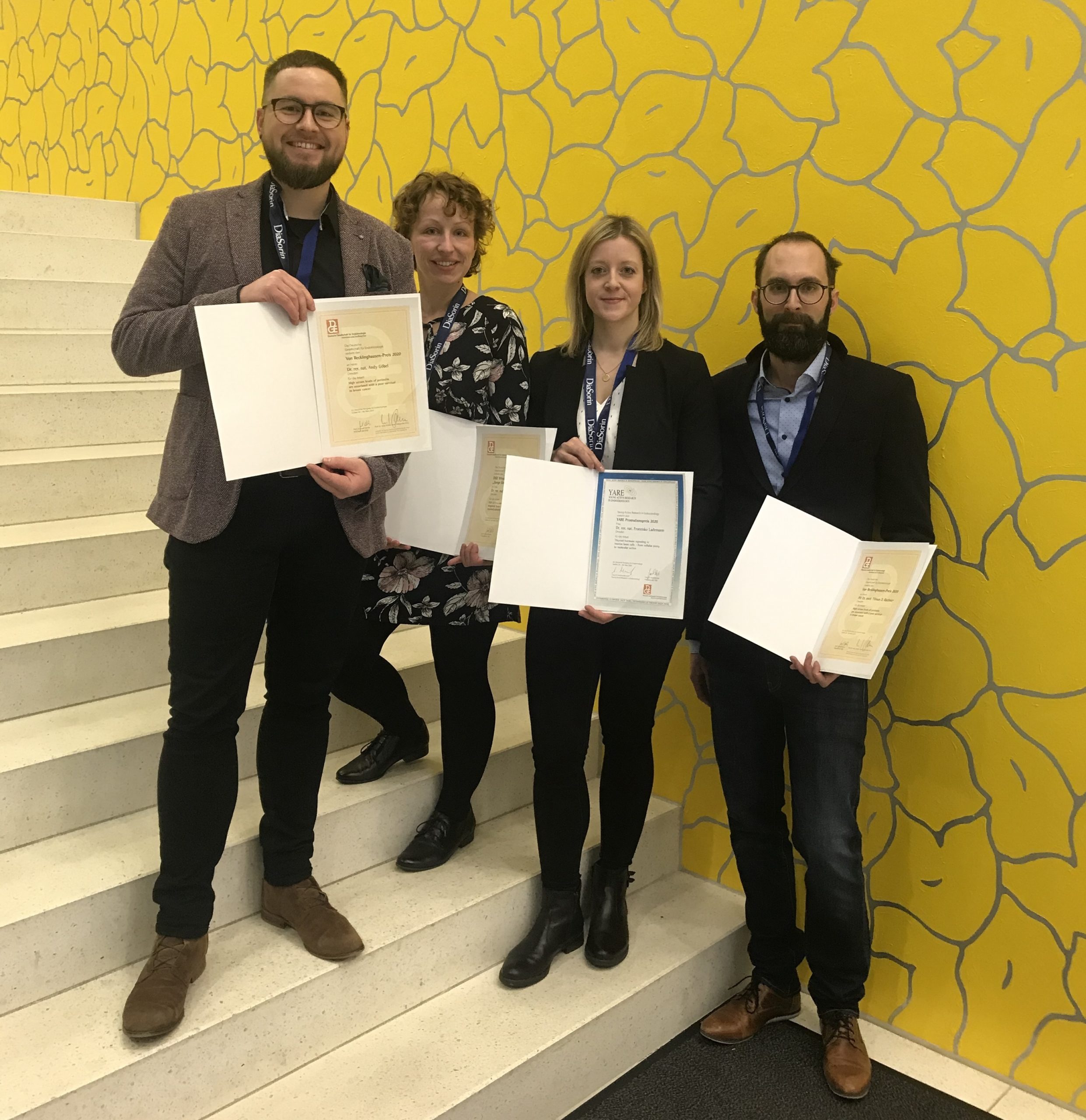
Dresdner Knochenforscher von der Deutschen Gesellschaft für Endokrinologie ausgezeichnet
Dresden, 6.03.2020
Die Deutsche Gesellschaft für Endokrinologie (DGE) ehrt auf ihrer jährlichen Tagung Wissenschaftlerinnen und Wissenschaftler für bedeutsame experimentelle Arbeiten. In diesem Jahr wurden gleich drei dieser Preise an das Bone Lab in Dresden vergeben.
Dabei ging der Preis „Junge Endokrinologie“ an Frau Dr. rer. nat. Heike Weidner. Sie konnte in einer Kooperation mit Kollegen aus Leipzig herausfinden, dass Knochenmarkveränderungen bei Myelodysplastischen Syndromen (MDS) mit einer Verschlechterung der Knochengesundheit einhergehen und dies im Zusammenhang mit dem Hormon FGF-23 steht. „Unsere Ergebnisse der translationalen Forschung geben einen Einblick, wie eine klinische Fragestellung zum Thema Knochenstoffwechsel bei MDS über die Grundlagenforschung beantwortet werden kann, um neue Therapieansätze zu entwickeln“, so die junge Wissenschaftlerin.
Ein besonderes Anliegen der DGE ist ebenso die Förderung des wissenschaftlichen Nachwuchses und die Anerkennung der Leistungen im Rahmen der Doktorarbeit. In diesem Jahr erhielt Frau Dr. rer. nat. Franziska Lademann den Dissertationspreis der Initiative „Young Active Research in Endocrinology“ (YARE) für ihre Untersuchungen über den Einfluss von Schilddrüsenhormonen auf den Knochenstoffwechsel. „Die Ehrung meiner Arbeit mit dem YARE-Dissertationspreis ist ein gelungener Abschluss einer erfolgreichen und erlebnisreichen Doktorandenzeit im Bone Lab“, erklärt Dr. Lademann.
Der diesjährige Von Recklinghausen-Preis für herausragende Arbeiten auf dem Bereich der Knochenforschung wurde an PD Dr. med. Tilman Rachner und Dr. rer. nat. Andy Göbel vergeben. Beide konnten in ihrer Arbeit einen neuartigen Biomarker bei Brustkrebs identifizieren. „Wir untersuchten im Serum von Patientinnen mit Brustkrebs das Protein Periostin, welches im Knochenstoffwechsel wichtige Funktionen erfüllt. Es zeigte sich, dass erhöhte Spiegel dieses Proteins mit einem verschlechterten Überleben assoziiert waren“, berichtet Dr. Göbel. „Biomarker in der Therapie von Tumorerkrankungen können für uns ein wichtiges Hilfsmittel sein, prognostische Aussagen über das Überleben von Patienten zu treffen oder das Risiko für die Metastasierung abzuschätzen“, erklärt Dr. Rachner.
Beide Wissenschaftler werden in den nächsten 3 Jahren vom neu etablierten Mildred Scheel Nachwuchszentrum (MSNZ) mit einer Tandem-Gruppenleiterstelle gefördert. „Als Team aus einem Molekularbiologen und einem Kliniker sehen wir unsere gemeinsame Expertise als ideale Kombination, die translationale Brustkrebsforschung am Standort Dresden weiter voranzubringen“, zeigen sich Dr. Göbel und Dr. Rachner zuversichtlich.
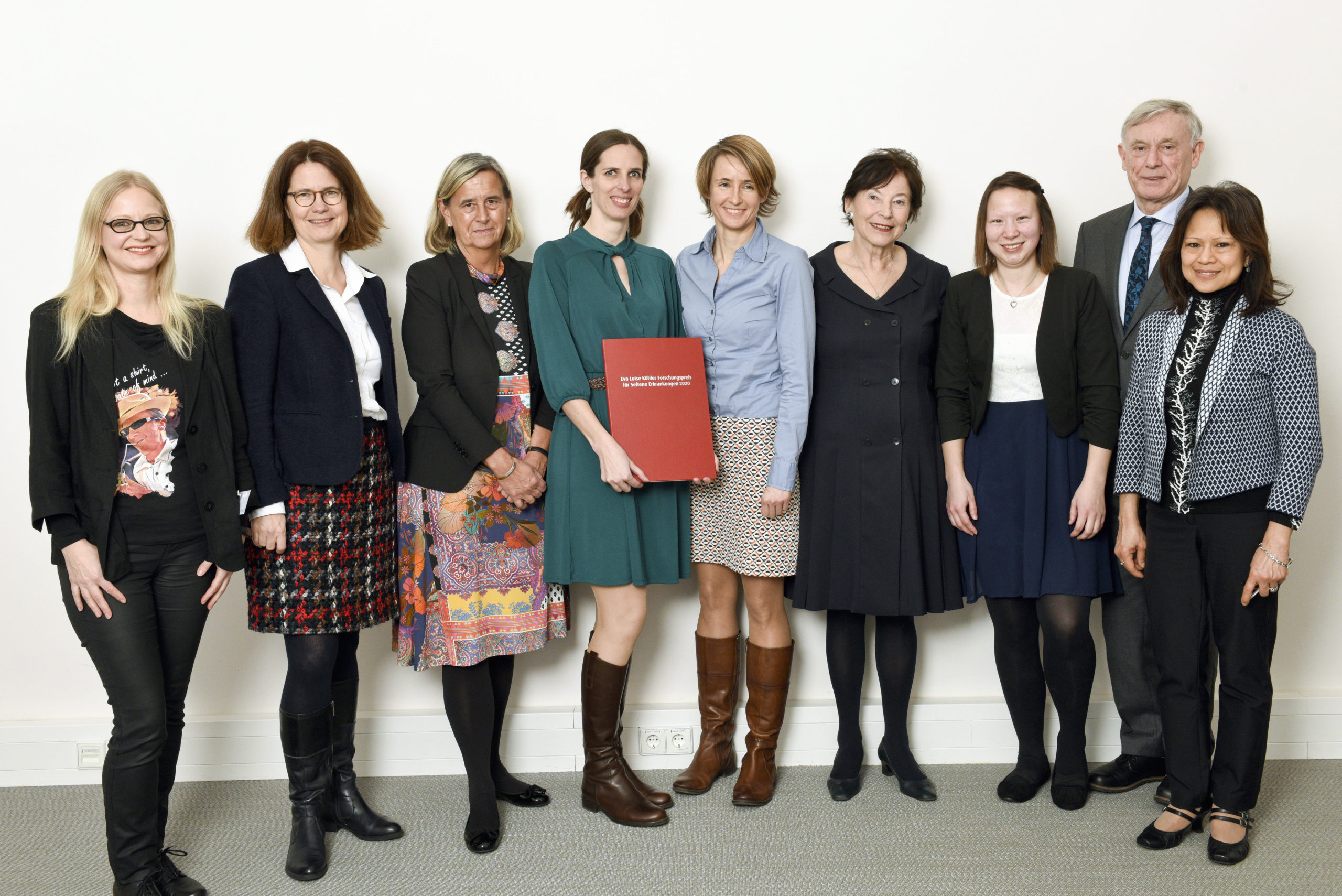
Prof. Martina Rauner und Dr. Ulrike Baschant erhalten den Eva-Luise-Köhler Preis
Dresden, 11.02.2020
Eva Luise Köhler zeichnet Prof. Martina Rauner und Dr. Ulrike Baschant für ihre Forschung zu seltener Knochenerkrankung aus – Seltener Gendefekt führt zu Verknöcherung des Bindegewebes –
Dort, wo gestern noch Muskeln und Bindegewebe waren, ist heute plötzlich Knochen – was klingt, als sei es einer verstörenden Novelle Franz Kafkas entnommen, erleben die Betroffenen von Fibrodysplasia Ossificans Progressiva (FOP) als grausame Realität. Durch einen Gendefekt bildet ihr Körper bei der Wundheilung kein Narbengewebe, sondern Knochen. Selbst kleine Verletzungen können dazu führen, dass Gelenke plötzlich unbeweglich werden und sich der Körper langsam versteift. Angesichts neuer Erfolge in der Grundlagenforschung dürfen die rund 800 Betroffenen weltweit neue Hoffnungen schöpfen. Für einen vielversprechenden neuen Therapieansatz, der die fortschreitende Verknöcherung hemmen könnte, zeichnet Eva Luise Köhler am 27. Februar 2020 in Berlin Prof. Dr. Martina Rauner und Frau Dr. Ulrike Baschant von der Medizinischen Fakultät der TU Dresden aus. Mit dem Preisgeld in Höhe von 50.000 Euro werden sie mit einem internationalen Team die Wirkungsweise eines kürzlich entdeckten Proteins, das die überschießende Knochenbildung hemmt, in genetisch veränderten FOP-Mäusen überprüfen.
Eine frühzeitige Diagnose und die Begleitung durch erfahrene Ärzte, die mit den richtigen Behandlungsstrategien vertraut sind, könne viel unnötiges Leid ersparen, erläutert Nadine Großmann, die im Alter von 13 Jahren ihre FOP-Diagnose erhielt. Viele Ärzte wüssten beispielsweise nicht, dass chirurgische Eingriffe unter allen Umständen vermieden werden müssen, weil sie massive Knochenschübe auslösen können. Dramatische Folgen hatte für sie beispielsweise eine Kiefer-Operation, nach der sie innerhalb weniger Tage ihren Mund nur noch 2 mm weit öffnen konnte. Der nächste Krankheitsschub versteifte spontan die rechte Schulter.
Ein überraschender Therapieansatz
Auf der Suche nach Therapieoptionen, die die fortschreitende Verknöcherung des Bindegewebes gezielt hemmen könnten, untersuchten die Wissenschaftler im „Bone Lab“ der TU Dresden im vergangenen Jahr auch das Wechselspiel zwischen dem Eisen- und dem Knochenstoffwechsel – zwei auf den ersten Blick unverwandte Systeme. Dass sich dabei ausgerechnet Transferrinrezeptor-2 (Tfr2) – ein Eiweißmolekül, das überwiegend in der Leber gebildet wird und für den Eisentransport verantwortlich ist – als äußerst wirkungsvolles Regulativ im entgleisten Knochenstoffwechsel von FOP-Zellen entpuppte, erstaunte selbst Martina Rauner, die sich bereits seit Jahren dem Studium von seltenen Knochenkrankheiten widmet: „Als wir gesehen haben, wie potent die Bindungsregion von Tfr2 die ungewünschten Ossifikationen, also das überschießenden Knochenwachstum, hemmte, war uns klar, dass diese Entdeckung Potenzial für die klinische Weiterentwicklung hat.“
Eva Luise Köhler verleiht am 27.2.2020 den nach ihr benannten Forschungspreis
Prof. Dr. Martina Rauner und Frau Dr. Ulrike Baschant von der Medizinischen Fakultät der TU Dresden verfolgen einen vielversprechenden neuen Therapieansatz auf Basis des Transferrinrezeptor-2 (Tfr2). Dieses Eiweißmolekül wird überwiegend in der Leber gebildet und ist für den Eisentransport verantwortlich. Die Forscherinnen haben ein rekombinantes, lösliches Tfr2ECD entwickelt, welches in das von FOP betroffene Gewebe injiziert werden kann. Hier bindet es an überschüssige BMPs und neutralisiert sie. Erste Tests verliefen bereits sehr ermutigend.
Mausmodell der Erkrankung macht Forschung möglich
Das therapeutische Konzept soll jetzt an genetisch veränderten Mäusen überprüfen werden, die eine befreundete Arbeitsgruppe um Prof. Eileen Shore von der University of Pennsylvania in den USA beisteuert. Bei diesen Mausmodellen ist ebenso wie bei Patienten mit FOP, durch eine seltene Mutation im ACVR1-Gen, der BMP-Signalweg überaktiviert. Im Rahmen des von der Eva Luise und Horst Köhler Stiftung geförderten Projekts kann nun detailliert untersucht werden, wie die Substanz auf den BMP-Signalweg einwirkt und welche Effekte dies auf die Mineralisation im Mausmodell hat. Auf dieser Grundlage könnte dann zeitnah eine erste klinische Studie in Angriff genommen werden. Wenn durch klinische Studien die Wirksamkeit und Sicherheit der Substanz belegt werden kann, könnte in 8 bis 12 Jahren ein zugelassenes Medikament auf Basis von rekombinantem, löslichen Tfr2ECD zur Verfügung stehen. Dieses würde FOP-Betroffenen beispielsweise direkt nach kleineren Unfällen appliziert, um die Auslösung eines Krankheitsschubes zu verhindern.
Der Eva Luise Köhler Forschungspreis für Seltene Erkrankungen wird am 27.02.2020 an Prof. Dr. Martina Rauner und Dr. Ulrike Baschant überreicht.

Join us at the Symposium on Biomaterial Science in Leipzig
Dresden, 27.01.2020
Tagung/Symposium am 20.03.2020 – 21.03.2020
Veranstaltungsort: Universität Leipzig, Paulinum
The CRC/Transregio 67 is organizing the 3rd International Symposium „Frontiers in Biomaterial Science“ with high-ranking international guest speakers at the Leipzig University from 20 to 21 March 2020. Prof. Lorenz Hofbauer and Dr. Juliane Salbach-Hirsch will present highlights of their research on sulfated glycosaminoglycans and bone regeneration.
Due to demographic developments, poorly healing wounds and broken bones are increasing significantly and represent a considerable socio-medical challenge. There is therefore a great need for new functional biomaterials to support the healing processes in bones and skin.
The Transregio 67 – an interdisciplinary collaborative research project of Leipzig University and the Technische Universität Dresden with 71 participating scientists – meets this challenge. We want to use the ability of the extracellular matrix, i.e. the complex environment of the body cells in all tissues, to stimulate the body’s own ability to regenerate. This approach has already made it possible to produce innovative biomaterials that can improve delayed wound healing in various model organisms.
TRR67 researchers now want to discuss these results with 19 internationally renowned experts. The two-day international symposium will focus on how scientists can learn from the processes of natural tissue development and healing for the development of healing supporting biomaterials.
Registration and poster submission are now open: www.trr67.de.
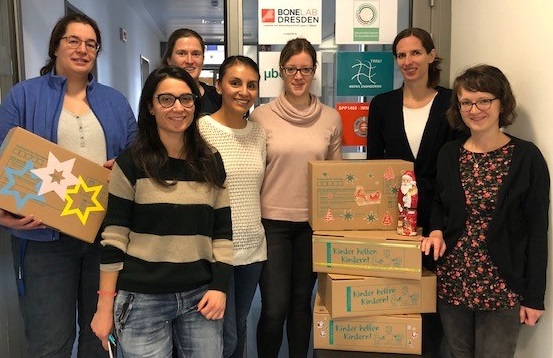
Bone Lab participates in the Charity “Kinder helfen Kindern”
Dresden, 18.11.2019
Not all children are fortunate enough to grow up in a prosperous country like Germany or Austria. That´s why we support “Kinder helfen Kindern by ADRA Deutschland e.v.” again, which provides Christmas presents to children in Macedonia and Albania, who may never have received Christmas presents before. We hope our little gifts bring joy to the children and their families and put a smile on their face because children are the future of our world! www.kinder-helfen-kindern.org
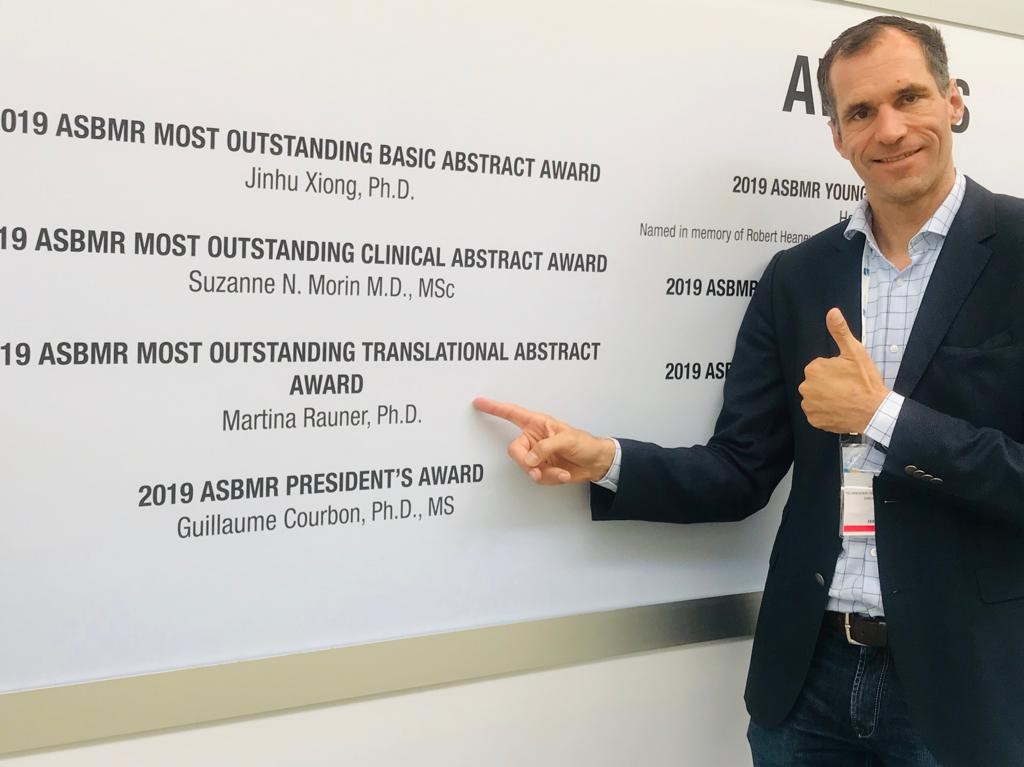
Bone Lab wins “ASBMR Best Translational Abstract Award”
Dresden, 25.09.2019
The ASBMR Most Outstanding Abstract Award is given to the highest scoring translational abstract submitted for presentation at the ASBMR Annual Meeting. In the abstract we show that T cell-derived Dkk1 controls bone remodeling in adult mice and that it contributes to bone loss induced by estrogen deficiency. This work demonstrates that bone loss after menopause may not only be mediated via direct actions on bone cells, but also via actions on other cell types, such as T cells. Congratulations, Martina!
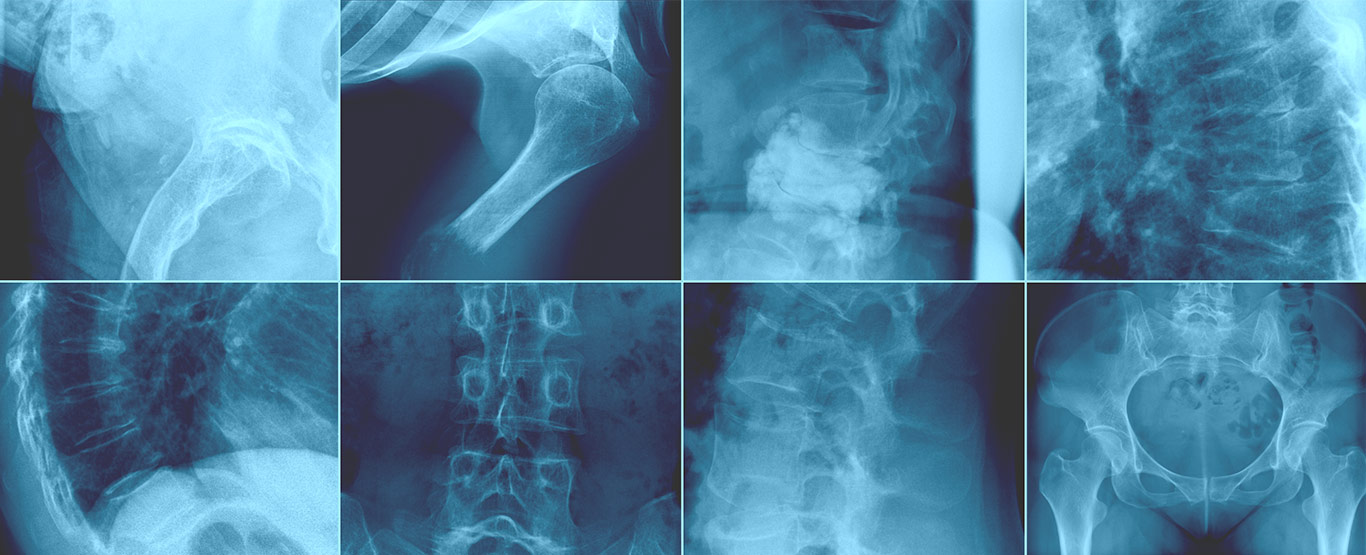
Two international experts providing insights into MSC epigenetics and iron metabolism
Dresden, 17.09.2019
The Bone Lab thanks Laura Silvestri from the Università Vita-Salute San Raffaele in Milan, Italy and Alexander Rauch from the University of Southern Denmark for their fantastic talks on iron metabolism and the control of hepcidin expression and the epigenetic control of MSC differentiation into osteoblasts and adipocytes. We learned a lot and are looking forward to further collaborations!
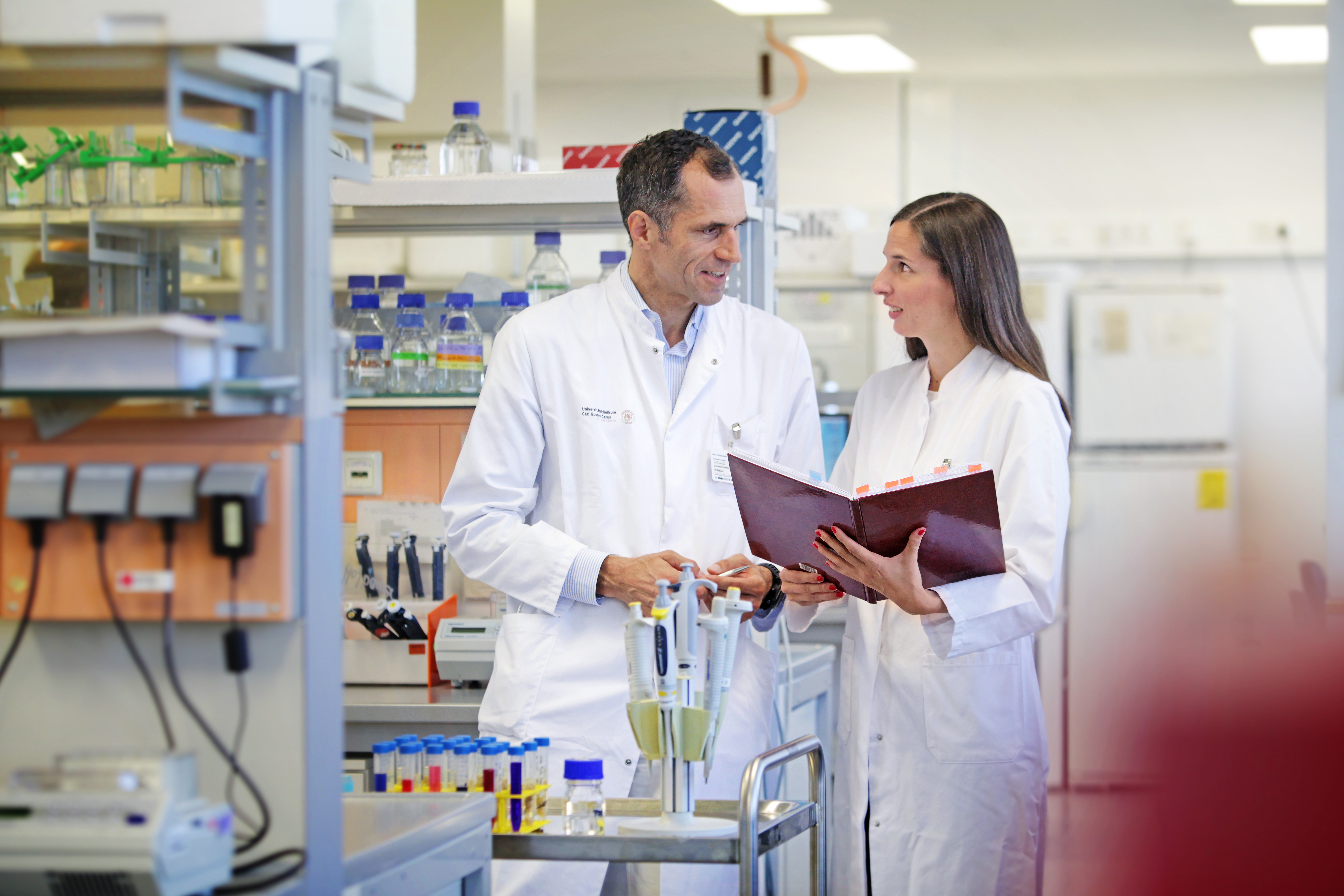
How does diabetes impact bone health?
Dresden, 05.09.2019
Diabetes mellitus is a widespread metabolic disease, with negative/adverse effects on many organ systems. Diabetes also significantly affects bone health. An increased risk of bone fractures and impaired fracture healing has been observed in patients, but the mechanisms are not fully understood. In order to investigate the links between diabetes and the bone system, the EU project “FIDELIO” will run for four years starting October 2019. This European Training Network, coordinated by scientists from the Faculty of Medicine of the Technical University of Dresden, is funded by the EU Marie Skłodowska-Curie Actions programme with a total of 3.8 million €. In FIDELIO, 14 ambitious and creative young scientists will be trained to tackle the future challenges of an ageing society.
To prevent bones from breaking, they must be healthy and strong. The regulation of bone metabolism is influenced by hormones, mechanical stress, and genetic factors. Diabetes mellitus is a serious and wide-spread condition affecting the whole body. Well-known complications include the heart, the kidneys or the eyes. However, what has only recently been discovered is that diabetes mellitus also has serious adverse effects on bone metabolism, resulting in an increased fracture risk and poor healing. How exactly do type 1 and type 2 diabetes damage the skeleton? What role do inflammatory processes and vascular damage play? Which new therapeutic approaches result from this? How can fractures be more effectively prevented? These are some of the questions that the scientists of the FIDELIO network aim to answer. Using a network of young talents and cooperation with industry, they expect to obtain novel insights into the risk factors and mechanisms of diabetic bone disease. New genetic and diagnostic markers could better identify patients at risk for bone fractures. Imaging techniques are essential for a more precise diagnosis. In collaboration with industry, new imaging-based methods for bone visualization will be developed to ultimately detect bone changes before they lead to fractures.
FIDELIO stands for “Training network for research into bone Fragility In Diabetes in Europe towards a personaLised medIcine apprOach” and is coordinated by the professors Martina Rauner and Lorenz Hofbauer of the Bone Lab of the Medical Faculty of the TU Dresden. “It will take highly qualified and specially trained scientists and clinicians to develop a new field of research into diabetes and bone. FIDELIO will educate 14 young scientists in an interdisciplinary, intersectoral and international environment and provide them with extensive knowledge and skills across the entire process chain,” says Martina Rauner, biotechnologist and professor at the Bone Lab Dresden. „FIDELIO is a clear commitment to Europe,” adds endocrinologist Lorenz Hofbauer. “We have top UK, Danish, Dutch, Swiss and Italian universities on board, an Austrian biotech company, and two German Universities of Excellence, TU Dresden and University of Hamburg. We expect a great conceptual and methodological exchange of young scientists at all locations. This innovation boost is good for all of us.”
The researchers and physicians involved in FIDELIO hope to use their findings to develop new prevention and treatment approaches to improve bone quality in people with type 1 and type 2 diabetes mellitus. Unravelling the diverse interactions and mechanisms of Action between glucose, fat and bone metabolism will increase our knowledge of bone health, ultimately allowing us to reduce the fracture burden and increase the quality of life of people with diabetes. In addition to gaining new scientific knowledge, the EU Marie Skłodowska-Curie programme aims to support the best scientific minds in Europe at different stages of their careers. As part of this programme, Innovative Training Networks (ITN) undertake innovative and structured training of junior researchers for up to four years, developing their potential to become leading scientists in the future.
There are 14 PhD positions open! Apply now and join us!

Congratulations to Dr. Colditz!
Dresden, 08.08.2019
Another PhD from the Bone Lab: Dr. Juliane Colditz! She defended her thesis entitled “Defining the role of DKK1 in bone homeostasis and the pathogenesis of postmenopausal osteoporosis” and successfully passed the Rigorosum. At the end of the day she left with a big smile and a Summa cum laude. Well done, Juliane!

